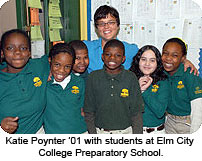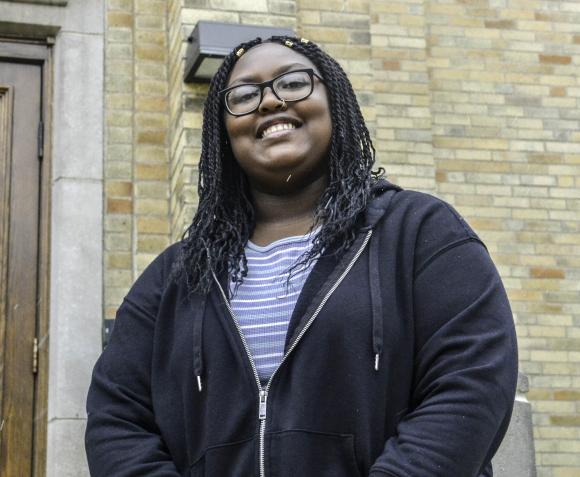The Thinker
 Katie Poynter has always been searching for meaningful ways to change the world. In college, she spent a semester living and learning in Uganda. She joined Teach for America after graduating from Saint Mary’s in 2001, and taught math in a Mississippi Delta school for two years. Today she is dean of students at an inner-city charter school in New Haven, Connecticut.
Katie Poynter has always been searching for meaningful ways to change the world. In college, she spent a semester living and learning in Uganda. She joined Teach for America after graduating from Saint Mary’s in 2001, and taught math in a Mississippi Delta school for two years. Today she is dean of students at an inner-city charter school in New Haven, Connecticut.
Where did Poynter’s search begin? In a freshman philosophy and literature class called “Meaning in the Mayhem.”
“The tandem course I took with [professors] Linn Vacca and Patti Sayre was why I became a philosophy major . It changed my life—and other people’s too,” she says. “Patti and Linn just had this way of making everything we were studying seem very relevant and, at least to me, very urgent.”
Junior year, Poynter read the work of Paulo Freire and did her senior comprehensive project on his educational philosophy. “Freire said that if you want to empower oppressed people to change their own lives, the only way to do it is through education. I was very inspired by that.”
Now, working with kids from disadvantaged backgrounds, she has daily chances to put ideas into practice. “I try to have a constant conversation with kids about why education is important. The way I explain it to them is that if you can communicate well with other people, if you can think clearly and if you’re well read, you’re going to have opportunities that you wouldn’t have otherwise.”
During stressful interactions or long meetings at school, she remembers to focus on the transcendent rather than the immanent—another lesson from philosophy class. “I try not to get caught up in the moment-to-moment, to transcend problems and keep perspective. It helps keep me going,” she says.
Next fall Poynter will start law school at Columbia University, studying international law and human rights. That’s a big shift, but she has clear advice for college students who are searching for meaning—and a major. “I would say study what you feel passionate about or what you find the most interesting. That’s how I ended up a philosophy major … I didn’t think much about whether that was a very practical choice or where it would take me.”
“Those are formative years of your life, from 18 to 22. Spending them thinking about ideas is a good use of that time.”

